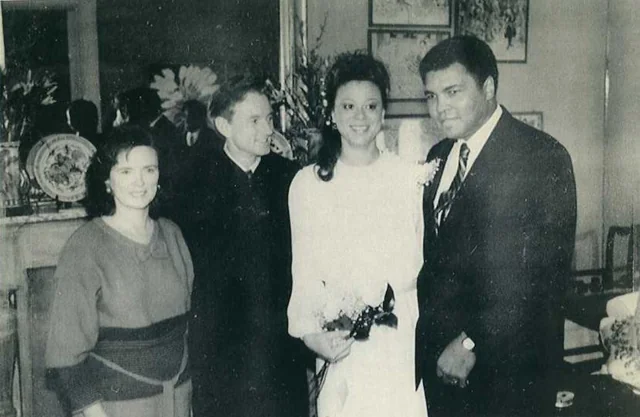Introduction: The Woman Behind the Legend
When we talk about Muhammad Ali, the world remembers him as “The Greatest” — a boxing icon, a man of conviction, and a global humanitarian. But behind every great man, there are untold stories, unheard voices, and unseen sacrifices. One such story is that of Sonji Roi, a woman of strength, confidence, and spirit who played a pivotal yet often overlooked role in the early life of the boxing champion.
Sonji Roi was born on November 23, 1945, in the United States of America, during a time of transformation and struggle for African Americans. Her life, though short-lived, remains an example of individuality and courage. She died on October 11, 2005, in Chicago, Illinois, but her influence and presence in the pages of history remain alive.
Early Life of Sonji Roi
Born into the heart of America’s mid-20th-century social evolution, Sonji Roi grew up witnessing both the beauty and challenges of being a Black woman in post-war America. Her early years shaped her independent spirit — she was bold, fashionable, outspoken, and unwilling to bend easily under social pressure.
She came from a working-class background, raised in a community that valued hard work and self-respect. Even in her teenage years, Sonji Roi was known for her charm, confidence, and natural elegance. She loved music, style, and self-expression, qualities that would later make her stand out in the glamorous yet rigid world of celebrity life.
Meeting Muhammad Ali – A Love Born in a Time of Change
In 1964, a young Cassius Clay — who would soon become known as Muhammad Ali — had just become the heavyweight champion of the world. He was young, charismatic, and already a global star. Around the same time, fate brought him together with Sonji Roi through mutual acquaintances.
Their meeting was electric. Sonji Roi was not just another admirer; she was witty, intelligent, and had a strong personality. Ali was immediately drawn to her confidence. In interviews years later, people described her as “beautiful and fearless,” the kind of woman who could hold her own in any conversation — even with a world champion.
Their connection was instant, and within just one month, Sonji Roi and Muhammad Ali got married on August 14, 1964. It was a whirlwind romance, filled with glamour, media attention, and the youthful energy of two powerful personalities coming together.
Marriage to Muhammad Ali – Love, Faith, and Conflict
The marriage between Sonji Roi and Muhammad Ali was both passionate and turbulent. It took place at a time when Ali was undergoing a major transformation in his life — not just as a boxer but as a man. He had joined the Nation of Islam, a movement that profoundly shaped his identity and worldview.
While Ali was embracing new religious and cultural values, Sonji Roi found herself at a crossroads. She admired her husband’s conviction but struggled with the strict lifestyle changes that came with his new beliefs. The expectations placed upon her as the wife of a public Muslim figure were far different from the life she had imagined.
She was asked to wear modest clothing, avoid certain social settings, and conform to a way of living that limited her freedom. For someone as expressive and free-spirited as Sonji Roi, this was suffocating.
In her own words, she once said, “I wasn’t born to wear scarves and long dresses. I wanted to be myself.” That statement reflected not rebellion, but the honesty of a woman who valued her individuality in an era when women were often expected to be silent.
The Short-Lived Marriage
After just one year of marriage, the relationship between Sonji Roi and Muhammad Ali came to an end. They divorced in January 1966, marking one of the earliest and most public separations in the sports world.
The reasons were complex — faith differences, public scrutiny, and personal incompatibility all played their roles. But above all, it was the clash between personal freedom and social expectations that tore them apart.
Despite the pain of the breakup, Sonji Roi carried herself with dignity. She refused to attack Ali publicly or exploit their relationship for fame. Instead, she quietly returned to her life, continuing to work and live on her own terms.
The divorce left an emotional mark on both of them. Ali, in later interviews, admitted that Sonji Roi had been a good woman, but their lives simply moved in different directions.
Life After Muhammad Ali
Following the divorce, Sonji Roi stepped away from the public eye for a while. She continued to live in Chicago, a city she loved for its vibrant music and cultural life. There, she became part of the local artistic and social scene.
She was known for her charisma and sense of humor. Friends often described Sonji Roi as a woman who could light up a room just by walking into it. Though her marriage to Ali had ended, she never became bitter. Instead, she spoke occasionally about her experiences — not as regret, but as part of her life story.
In later years, Sonji Roi worked in business and remained connected to her community. She supported young people and artists, often giving advice about confidence, respect, and independence. Those who knew her said she always carried herself with grace, even when life threw challenges her way.
The Personality of Sonji Roi
What made Sonji Roi truly unforgettable was her authenticity. In a world where people were often defined by others’ expectations, she refused to lose herself. She was stylish, outspoken, and unapologetically modern for her time.
Her elegance wasn’t just about clothes; it was about presence. She had a voice that carried confidence and an attitude that radiated self-belief. Even though she was often labeled “rebellious” in the media, in truth, Sonji Roi was simply a woman who wanted to live by her own values.
She represented the changing face of the 1960s — a decade that redefined women’s roles, racial identity, and freedom of thought. In many ways, Sonji Roi symbolized the voice of women who dared to be themselves even when society said otherwise.
Cultural and Historical Significance
Though her marriage to Muhammad Ali lasted only a short while, Sonji Roi played an important role in his personal journey. Her presence marked the transition between Cassius Clay, the young champion, and Muhammad Ali, the spiritual and political icon.
She was there during one of the most transformative periods of his life — when fame, faith, and identity collided. Their story is a reminder that even brief relationships can leave lasting impacts on history.
Sonji Roi’s independence forced Ali and those around him to confront ideas about women, religion, and personal freedom. She challenged traditional notions of what a “wife” should be — and by doing so, she quietly influenced cultural conversations about women’s rights and individuality.
Her Legacy – More Than a Name in History
When Sonji Roi passed away on October 11, 2005, in Chicago, Illinois, she was 59 years old. Her death went largely unnoticed in mainstream media, overshadowed by the legend of her former husband. Yet for those who remembered her, she remained unforgettable.
Her story wasn’t about fame — it was about integrity. She lived a life of quiet strength, refusing to compromise who she was. Her legacy continues not in headlines but in the memories of those who admired her courage to stand alone.
Even today, researchers, writers, and historians revisit her life to understand the human side of Muhammad Ali’s early years. Without Sonji Roi, the story of Ali’s transformation would be incomplete.
Lessons from Sonji Roi’s Life
-
Individuality Matters:
Sonji Roi teaches us that staying true to oneself is more important than pleasing others. Even when surrounded by power and fame, she chose authenticity over conformity. -
Courage to Walk Away:
It takes immense strength to leave a situation that doesn’t align with your values. Her decision to walk away from a marriage to one of the most famous men on earth shows bravery and self-respect. -
Grace in Adversity:
Sonji Roi never used her connection to Muhammad Ali for publicity. She maintained dignity and privacy, proving that class and integrity define a person more than fame. -
The Value of Self-Expression:
Her love for music, fashion, and art showed that expression is not vanity — it’s identity. Through her style and presence, she represented the voice of many women who felt silenced by tradition.
Remembering Sonji Roi in Pop Culture
Although her life wasn’t heavily portrayed in films or documentaries, Sonji Roi occasionally appears in stories about Muhammad Ali’s early life. In dramatizations and biographies, she is often depicted as a free-spirited woman who couldn’t be contained by the expectations of religion and fame.
However, her portrayal is often brief — something that historians and writers are now re-examining. Many argue that Sonji Roi deserves a fuller, fairer depiction, not as a “footnote” in Ali’s story, but as a woman of substance in her own right.
The Spiritual Side of Sonji Roi
Though she struggled with the strict practices of the Nation of Islam, Sonji Roi was deeply spiritual in her own way. She believed in God, love, and kindness — but she didn’t believe faith should take away one’s personal freedom.
Her concept of spirituality was open-minded and heartfelt. She saw religion as a way to uplift people, not to restrict them. This belief often put her at odds with Ali’s new circle, but it showed her clarity of thought.
For Sonji Roi, love, honesty, and respect were the true pillars of a meaningful life.
Her Final Years
In her later years, Sonji Roi lived quietly in Chicago. Though she faced health challenges, she continued to maintain her independence. Friends recalled that she still loved dressing elegantly, listening to jazz, and reminiscing about her younger days with humor and pride.
She never remarried, and when asked why, she often replied with a smile — “Once you’ve been married to the greatest, what else is left?” It was said partly in jest, but it reflected the sense of closure and peace she carried.
When she passed away in 2005, her story faded into history’s margins, but her spirit remained unforgettable for those who understood her journey.
Why Sonji Roi’s Story Still Matters
In today’s world, where conversations about women’s rights, personal freedom, and identity are more important than ever, the life of Sonji Roi offers powerful lessons. She represents a woman who lived authentically during a time when authenticity was often punished.
She showed that love, even if short-lived, can still be profound. She showed that disagreement doesn’t mean disrespect, and that walking away doesn’t mean failure.
Most importantly, Sonji Roi reminds us that history isn’t only written by those who make headlines — it’s also shaped by those who quietly refuse to lose themselves.
Conclusion: The Legacy of Sonji Roi
Though her marriage to Muhammad Ali lasted only a brief moment in time, the life of Sonji Roi continues to inspire. She was more than just the first wife of a boxing legend — she was a woman of heart, faith, and fire.
Born on November 23, 1945, and leaving the world on October 11, 2005, Sonji Roi lived through eras of change, from segregation to empowerment, from silence to self-expression.
Her story is not about being overshadowed but about standing tall in one’s truth. Through her courage, confidence, and conviction, she became a quiet icon of independence and strength.
So, while the world celebrates “The Greatest,” let us also remember the woman who once stood beside him — Sonji Roi, the woman who gave love to a legend and left behind a legacy of her own.


